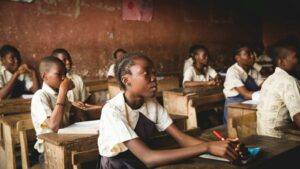Rights For Women In Nuba Mountains/ Southern Kordofan

Introduction
The recent phase of conflict in the Nuba Mountains/ Southern Kordofan (NM/ SK) broke out on June 2011, even before South Sudan became a separate country. Sudan People’s Liberation Movement/ Army – North (SPLM/A – N) operating in NM/SK have been countered by Government of Sudan (GoS) offensives and bombing that targets civilians suspected of backing the insurgency.
The citizens of the Two Areas are currently experiencing a cessation of hostilities between the Government and SPLM/A – N, but Antonovs occasionally circle above without bombing, local farmers told Words in the Bucket (WIB).
The ongoing nine-year conflict is essentially an extension of the long civil war that eventually provided South Sudan its independence in July 2011. The people of the Two Areas played a key role helping the former South Sudan Comrades gain sovereignty. But nothing changed in the Two Areas – unfulfilled promises of autonomy and suspected rigged local elections triggered renewed fighting between the Sudan government and SPLM/A – N.
This conflict created many vulnerable groups in the Two Areas among them are women.
Methodology used
- Use of questionnaire – please fill in
- Direct interview
- Focus groups
This research report summarizes the current women rights situation and abuses including the challenges women are facing in the Two Areas. NHRMO spoke to a total of 254 individuals (150 women and 104 men) were interviewed respondents and 2 focus group discussion were used to gather data in the Two Areas, specifically in the territories under the control of the SPLM/A – N to inform this paper.
The methodology adopted consisted of qualitative interviews with individual respondents and focus groups of 10-15 persons in both areas. In BN the respondents included 60 women and 40 men, in SK 90 women and 64 men. There were also 75 one to one interviews.
Findings
It was learnt that to some extent women are treated equally only in SPLM/ – N controlled areas,
but in Sudan are not treated equally, both men and women are given right to say what s/he wish to say despise of the gender differences, as it is seen there are no human rights for women in Sudan. Women are nothing in Sudan as seen in most of other Islamic states.
Generally, in the Two Areas both men and women they have equal say over how household money are spent but for sometimes men controlled everything in the family and give little or no responsibility to the women, but when needs something she always ask men if she will be allowed to do it. Both women and men are vulnerable to any violence but most of the time women and children are common in any situation, like drought or famine.
women play great role in the community! Most of a women’s time is spent in work. A woman works just like a man does in the Two Areas, for example, a woman can cultivate and harvest the produce just like a man. She can herd the cattle too. On the other hand, a woman can be a teacher, an administrator in any profession like in hospitals and can earn the same as any other man. A woman also has a voice to speak her mind in any gathering.
Concerning the household items, things like animals and money are spent after both (man and woman) have decided to spend. But sorghum is only spent by a man after it has been stored in the store.
Women in this area they share little leadership role in the community, most of the time at lower level are women and at high level leadership are men, this is as result of luck of education to women or women are not learnt. No the goal of gender equality has not yet been achieved, more need to be done so that women can reach men in education etc.
In our situation here there is a bit balance roles and leadership for both men and women in (SPLM/A-N) controlled areas than in Government controlled areas. (SPLM/A-N) they are encouraging and promoting girls’ education, this is supported by establishing girls court, whoever pregnant school girl, are taken to girls’ school court for judgement. The court is monitored by high range SPLM/A-N Command to see if there is any complication or needs in the court. We are happy for this court because it will threat men not approach to school girls for marriage whose ages do not reach to 18 and above.
Said by a young lady in Blue Nile (BN)
Women should be treated equal as men, I agree that women should be allowed to choose freely who to marry, have equal access to work & similar jobs including equal payment. Women should be allowed to own property and cattle, equal say to resource utilization like spending money. Women should be allowed to speak their mind. Women are not treated equally to men because men tend to favor themselves more than women. Women are the most vulnerable to violence than men in any difficult situation like attacks, drought and famine. Women should be encouraged to express their feels when their fell that are not treated well.
“Women are not treated equally to men because our Nubian culture made a man a head of everything at home and in the community. There are circumstances you would select a man over a woman like the field work during rainy season when the weather is so bad woman cannot work during this condition”. Group one response
“I strongly agree that both men and women should be treated equally and I strongly agree that women should be allowed to choose freely who she wishes for marriage, I agree both men and women should have equal access to work. I strongly disagree that, man and women to do the same work however, there is some work that required a lot of energy and muscle that, women do not have for instance doing harsh work. I agree that both men and women can own cattle and they should both have equal say over how household resources to be used” Research Respondent (NM/SK)
“Both men and women they have equal role in running the household but very few people the ignored that, both women and children are the most vulnerable to violence’s in the society in any situation, attacks by the enemies, diseases, drought and even famine, women can speak up their minds equal to men, wherever they think that they are not treated equally”. Research Respondent (BN)
“Women are not treated equally to men because the community know nothing about Human Rights and women rights and they depend on their traditional background men is better than women”. Group two response
Majority of women in Sudan are not allowed to speak up due to cultures, beliefs and religious reasons.
“I agree that men should not beat their wives and they should allow them to speak up their minds equally to me. Women are not treated equally in Sudan because of cultures, beliefs and some religious like Islamic that do not allow women to have their rights, in this cases woman are considered less than men. Yes, women they do work, they cultivate, harvest, making a local house like huts and few works in offices, in some circumstance like those women who’s their husband die they found themselves doing very harsh work like manual work in order to earn the family income”. Research Respondent (NM/SK)
It was further learnt that women are not involved in leadership role.
Why shouldn’t women take on leadership roles as well as men, in church, government work, Organizations and so on, the goal of gender equality has not yet been achieved because very few people consider it like about 25%. Although SPLM – N is giving women 35% representation in everything.
“Women in this area they share little leadership role in the community, most of the time at lower level are women and at high level leadership are men, this is as result of luck of education to women or women are not learnt. No, the goal of gender equality has not yet been achieved, more need to be done so that women can reach men in education etc. In our situation here there is a bit balance roles and leadership for both men and women in (SPLM/A-N) controlled areas than in government-controlled areas. (SPLM/A-N) they are encouraging and promoting girls’ education, this is supported by establishing girls court, whoever pregnant school girl, are taken to girls’ school court for judgement. The court is monitored by high range SPLM/A-N Command to see if there is any complication or needs in the court. We are happy for this court because it will threat men not approach to school girls for marriage whose ages do not reach to 18 and above”. Research Respondent (BN)
“Women talk less leadership role in the community; the goal of gender equality is not yet achieved because Sudan is politically not stable”. Research Respondent NM/SK
“Women are not allowed to take on leadership roles because women are so emotional and can’t control the community lastly the goal of gender equality has not been achieved because the Tobo community are totally covered by traditional so is too difficult to make” Group one response NM/ SK
Below are photos of part of the focus groups NM/ SK


Conclusion
In this research, it was learnt that there are no human rights for women in Sudan. Majority of women in Sudan are not involved in leadership role and not allowed to speak up which is probably due to cultures, beliefs & religious and due to lack of education hence the need to address through raising awareness on human rights and importance of education for women in Sudan especially in the Two Areas.
Recommendations
- Conducting workshops with the local authorities about gender base violence in order to eradicate it.
- Conduct community mobilization events as it is one of the ways to raise awareness among the community.
- Urge the Authorities particularly the police in order to handle and follow-up on gender base violence so as to protect the women.
- Lack of education in the Two Areas specially for girls’ education, serious actions need to be taken in order to reduce illiteracy among women.

